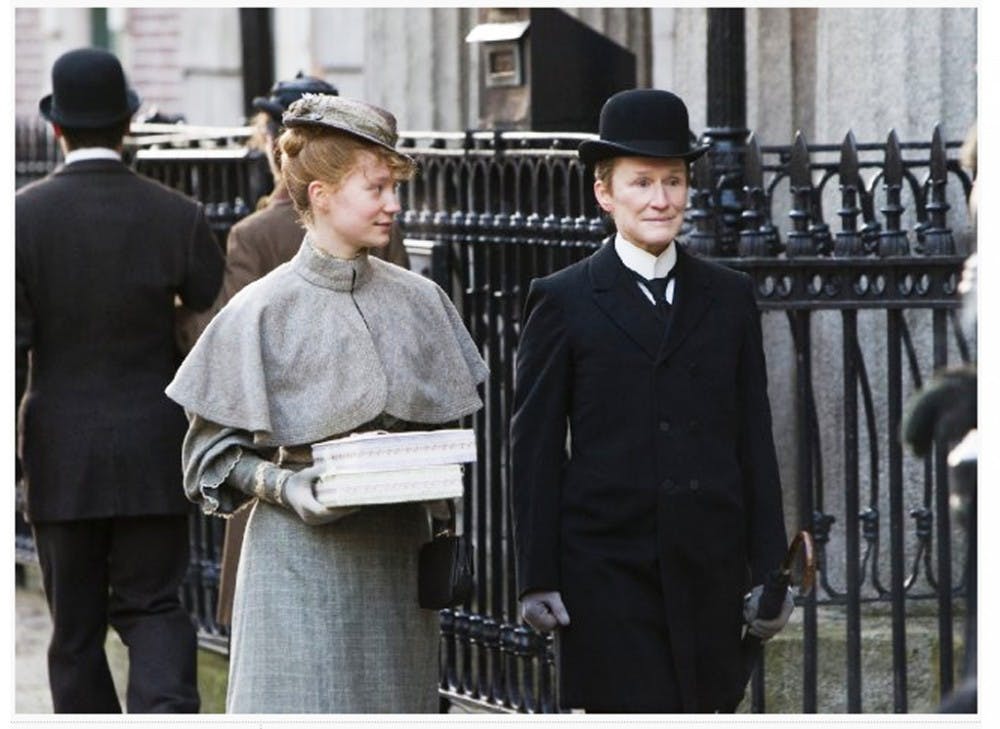Albert Nobbs, starring perennial favorite Glenn Close as a cross-dressing waiter, aims high but falls short of what could have been Oscar-worthy material.
Originally a book by George Moore, and later adapted into a play by Close herself, Albert Nobbs takes place in the industrial, American-dream obsessed bustle of 19th century Dublin. Albert-—Close’s male pseudonym—works as a waiter in a hotel run by a presumptuous and fastidious Mrs. Baker (Pauline Collins). To no one’s knowledge, Albert saves her daily earnings underneath her bedroom floor to purchase her own tobacco store.
Although questions of sexuality can be found subtly throughout the film, it ultimately seems far from director Rodrigo Garcia’s focus. In fact, Albert’s character is so meek and one-dimensional that she comes off as asexualized. On the contrary, Albert’s later companion Mr. Page (Janet McTeer), the hotel’s gruff, interior painter and also a woman in disguise, far more clearly displays a preference for women through her loving marriage to wife Cathleen.
So no, the film doesn’t revolve around Albert’s crisis about her gender identity. When Mr. Page asks Albert for her real name, probably expecting a hesitant but endearing “Alberta” at the very least, Albert stares back at Mr. Page soberly and dryly utters, “Albert.” Struggles of gender identity seem to be the last thing on Albert’s mind.
Despite what the film’s trailer seems to suggest, it is also not about any unrequited love from Albert toward young, coquettish Helen (Mia Wasikowska). She appears in Albert’s mirage of a successful future merely as an appealing ornament to greet customers in the tobacco store. Marrying Helen becomes an obsession for Albert, as she calculates the cost of each date, strategizes as to the revelation of her gender and ponders her competition against Helen’s eye-candy boyfriend Joe (Aaron Johnson), just to procure the token wife that comes with her vision of a successful life.
Close is indeed convincing as poor, repressed and occasionally funny Albert (and by funny, I mean so ridiculously awkward that it’s humorous). Whether her performance deserves her recent Oscar nomination, I’m a bit hesitant to say, which is why I’d much rather point the finger of blame to Garcia. All throughout the film, there is an inexplicable disconnect between Albert’s dark Dickensian orphanhood and her now naive, one-track mind. There are many moments where the film dances atop some barrier to a deeper understanding of Albert, but it fails to ever break it.
I will say this: Garcia masters aesthetic subtlety. I’m not sure if that’s just indie film norm, but there is a beauty to the little-less-than-done appeal of the entire film. Yet, sadly, he fails to deliver poignancy. There are films that draw me in and I become uncontrollably submerged in the story, characters and action. Then there are films like Albert Nobbs, where I leave the theater a bit tired, to be honest, from having to engage in the story myself.
—Jamie Moon
Get The Chronicle straight to your inbox
Signup for our weekly newsletter. Cancel at any time.

